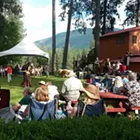The 41-year-old writer-director, first known for In The Company of Men, has just finished two features: the romantic intrigue Possession, from A. S. Byatt's intelligent, intricate best-seller, and the filming of his recent play, The Shape of Things. Possession intertwines two passions in two periods. In the modern day, icy Brit gender studies prof Maud (Gwyneth Paltrow) is forced to reevaluate her research when American grad student and poet Roland (Aaron Eckhart) finds letters between his subject, Randolph Henry Ash (Jeremy Northam), a Robert Browning-like Victorian poet, and Christabel Motte (Jennifer Ehle), a lesser-known poet of that fictionalized time. The more the modern duo uncover, the more they find themselves admiring, desiring and resisting each other, leading to a more tentative romance than the fiery affair that sweeps the two proper Victorians away.
LaBute laughs when asked whether the handsome, almost austere Possession will be viewed as a departure. "For the three months until The Shape of Things comes out!" He grins. "Then people will go, 'Look, you hate women again, what happened? You were doing so good.' That's just the way it goes. I was interested in it as a reader as much as anything. The idea that this romance has come out [under my name] rather than an examination of the ends of relationships, yeah. A momentary departure, but I wouldn't set my compass by it. It's only the fourth movie [I've made]. It makes for a very small departure in a very small body of work."
One constant in his features to date is the casting of Aaron Eckhart, a good friend of LaBute for more than a decade. A good luck charm drawn from theater days? "I owe him money, y'know. So what are you going to do?" The smile again. "Probably because of the fact that we're friends and that I've known him for as long as I have, I get even more intrigued by him. He doesn't have the same kind of celebrity Gwyneth has, but I know him for 10 years. I know the guy, yet he can still walk onto a set and disappear into a role. I haven't been able to find a role in his age range that I don't think he can do. And I like being around him, watching him work. He's my guy."
Paltrow was a different story. "She was obvious. It was more a question of, 'Do I want to do something that's so obvious and right?' " he says. "Everything that a studio could want was there: she'd had success in period films, success at the box office in general, she had done British dialect, not just once, but many times. A star, a celebrity, she's a great actress. She has managed to be one of the handful of contemporary actors who are iconic as well. People are interested in pictures where she goes to get coffee. When it's so obvious, you second-guess yourself. I was going, 'That's too perfect, isn't it?' In fact, we need someone like her, not just to play the part, but to get the film going. We need someone who will be the keystone to this, because I am very interested in having Aaron be in this, and they're not going to look at that, and say, 'Oh he's the obvious choice.' It's all about track record in the studio system."
We've had a hundred
years of Freud, but it seems like the Victorians get the unhesitant, smoldering sex here. "Both Laura [Jones, the co-writer] and I loved the idea that it's really the Victorian story that seems the most passionate: that in this very strict environment in which the Victorians lived -- and albeit, they're poets, they're not street cleaners who have very limited leisure and a very limited education. These people, they couldn't literally meet someone and say, 'Y'know, I am so knocked out by you, I don't know what to do, I don't want to walk out of this room and I'll never see you again.' They had to go and write a letter, 'Oh it would be so lovely to perhaps see you...' "
When the first letter is found, Roland's ideas about his education are shaken, and then his reluctance to love in our modern world.
"When Roland finds [the first letters], it just shakes the world, the foundations of his scholarship. 'Wait a minute, I know everything about Ash, he was married and he was a scientist and I can tell you everything he wrote, he never spoke to another woman, let alone... These just can't be his.' That creates a passion inside Roland. But the idea [we were challenged to capture is] that the Victorians could only speak in a figurative, metaphoric language of their writing or their poems, their letter writing. They were willing to put this physically to the test: 'Let's run away together for a month. It'll only be a month, but it'll be ours.' Those people were in a society that would have looked mercilessly down on them, who were willing to risk that, and to say, 'No matter what happens, no matter how bad it gets, it was worth it, because of the way I feel about you.' And I think Maud and Roland were very sure about what they [thought they would] learn from the past and are quite shaken in the end by what they actually learn."
So freedom is not what it's cracked up to be?
"In an age of complete consent and freedom, we're often kind of blinded by the sheer amount of choices. You can do anything you want. Talk to anybody, say anything, within a very broad amount of reason, and they are either blinded by those choices or they've been burned by them. They're frightened to take a plunge again, and so they learn something valuable from people they thought there was nothing left to learn about."















